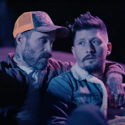
In white South Africa, the nation’s same-sex marriage law has been widely celebrated. In black South Africa, not so much.
While Afrikaners are trekking up to Cape Town’s Table Mountain to say “I do” in decent numbers, the four years where gays could marry has yet to affect many blacks (read: the majority of the country) in townships, the New York Times reports.
But even as human rights advocates praise the country’s legal openness and the economic windfall that has accompanied same-sex nuptial tourism, they fret that the law, like so much of the new South Africa’s promise and prosperity, has bypassed many of the country’s citizens, particularly in the black majority.
Anthony Manion, director of Gay and Lesbian Memory in Action, said the law had largely failed to benefit blacks living in the impoverished townships that stretch for miles outside cities like Cape Town and Johannesburg. In them, gay men and lesbians often face unabashed discrimination and violence; advocates say that a growing number of lesbians have become victims of so-called corrective rapes aimed at ridding them of their sexual orientation.
“The vast majority of gay people in South Africa are still shut off from marrying the partner of their choice because of the deep economic inequality, social isolation and cultural exclusion,” Mr. Manion said.
Not that gay white Afrikaners had it easy.
Others say change in the socially conservative townships will take time, and they point to a shift in attitudes among Afrikaners — the white minority that once imposed racial apartheid on the nation — and within the mixed-race population known as coloreds. Mr. Brits, for one, said it was striking that 80 percent of the South Africans he has married have been Afrikaners, who come from a community that has long condemned homosexuality.
Perhaps most astonished are the same-sex couples who expected far more resistance among their families. When Jens Von Wichtingen, a German, and his Afrikaner husband, Daniel, who took his surname, married in February after 17 years together, they were surprised at how readily Daniel’s deeply religious parents accepted their union.
Or quite likely, like most things “concerning race,” the issue is really about socioeconomic class. And in post-apartheid South Africa, whites still disproportionately enjoy higher paying jobs and hold more wealth than their black and colored counterparts, many of whom call townships — vast cities constructed of shacks — home.
How about we take this to the next level?
Our newsletter is like a refreshing cocktail (or mocktail) of LGBTQ+ entertainment and pop culture, served up with a side of eye-candy.
[pictured: Vernon Gibbs and Tony Halls, South Africa’s first gays to get married, in 2006]


















anonymous (not that one)
Is it me or is something wrong with the title of this article? I’ve read it six times and still can’t get it to make sense.
Viral
@anonymous (not that one): No there is nothing wrong with the title, South Africa still has a large spread of segregation and the title is implying that the Blacks of the country still have less rights than the Whites, at least specifically in terms of getting married in the country
Rhanjid
South Africa seems to be extremely liberal if you take in account that this Jens von Wichtingen is a Nazi who hates minorities – see here: http://moslaemm.blogspot.com/search/label/Jens%20von%20Wichtingen
I wonder how he can live with this double standards, hating other people but taking all privileges for himself and his life.
Swiss
Rhanjid, did you actually see that this strange blog is run anonymously and slandering many people that stood up for democratic values – and so Von Wichtinge. Pleeeeeeeze, before you post such nonsense, inform yourself
Reserve
So white South Africans are more gay-friendly than black South Africans. No surprise here.
Hilarious
@Reserve: Yeah the same white “South Africans” you’re patting on the back only brought their hate filled religion to South Africa and brutally mistreated entire groups of people on top of spreading severe amounts of racism.
Ironically you’re going on about homophobia when those same white people make the KKK look tame.
Sheer hypocrisy at it’s best.
Reserve
I’m not especially patting them on the back. It’s just an obvious thing. The white South Africans are basically Europeans, and black South Africans are more African. And you can’t say there’s not a difference between the way those two “peoples'” think about homosexuality, in general. The article is not surprising. Though it’s a good subject to cover.
Reserve
Bishop Tutu is very good regarding gay rights, though.
Jürgen
@Swiss
I googled about that Jens and found less charming things including this at least in English: http://tiny.cc/zke2w
You probably have to understand German to see the full extend of the information about that von Wichtingen. I’d say if someone is/was a member of such a Nazi group like “Kameradschaft Gera” it it quite convincing. I always wondered how gays can be Nazis …
Anyway, it is quite nice to see liberal countries that are not homophobe.
gksa
@Hilarious: Judging white South Africans, forever and always, as supporters of apartheid is actually just a different form of racism. We are not all the same, in fact, many gay white South Africans were very active in the struggle against apartheid, because it oppressed them too. That is why they also got a seat around the table when the new constitution was drafted – resulting in the fact that gay rights in South Africa is now entrenched in our constitution.
Keep in mind that another significant portion of white South Africans, in later years, did not support apartheid, but were afraid to speak out against it, just like many Germans were during the third reich. Otherwise the (whites-only) referendum in ’91 on whether to continue dismantling apartheid would never have succeeded. Not very brave of them not to speak out, perhaps, but not inherently evil, either.
Another significant portion of white South Africans had only been born after apartheid, or were still in primary school (like me) when it ended. I never even knew what apartheid was – and that other parts of the world did things differently – until years after the first democratic elections. Many of us younger white South Africans are actually horrified that “our people” could’ve perpetrated such an atrocity.
So please don’t judge all of us the same.